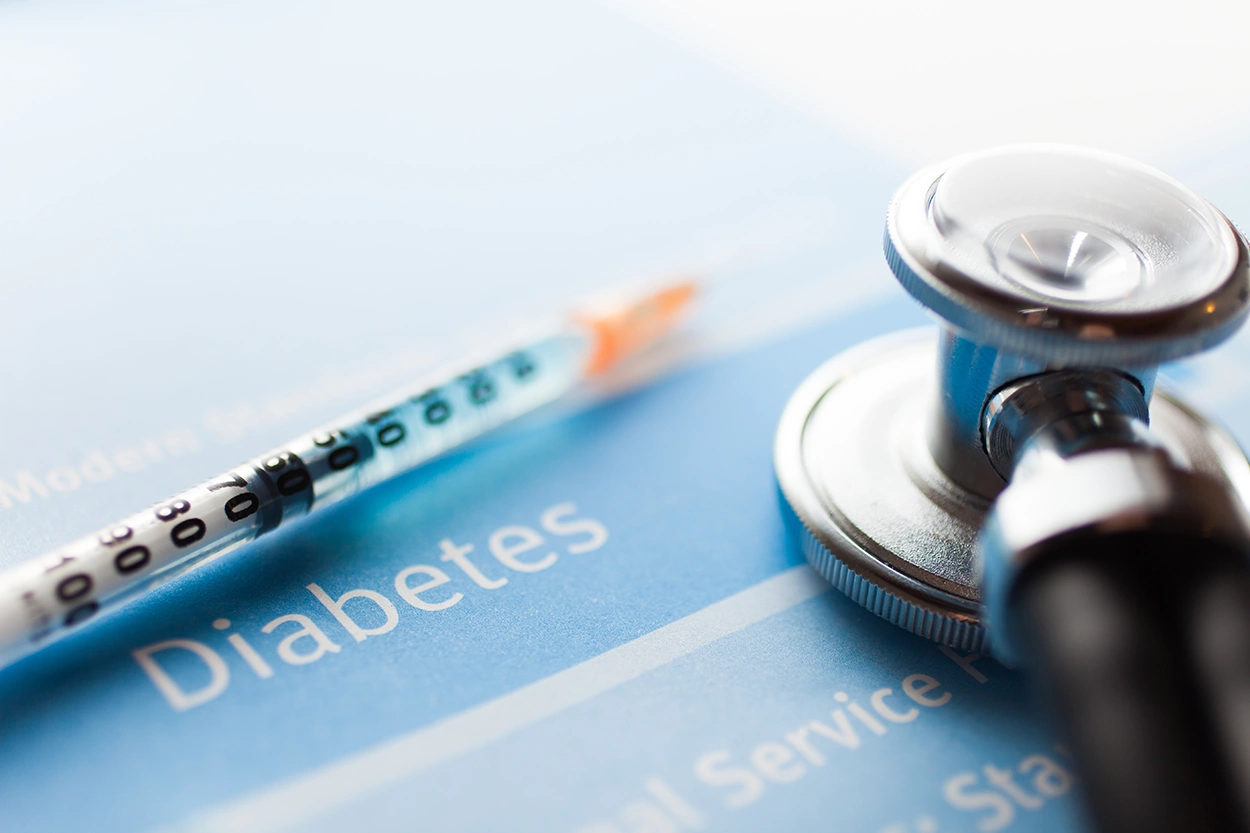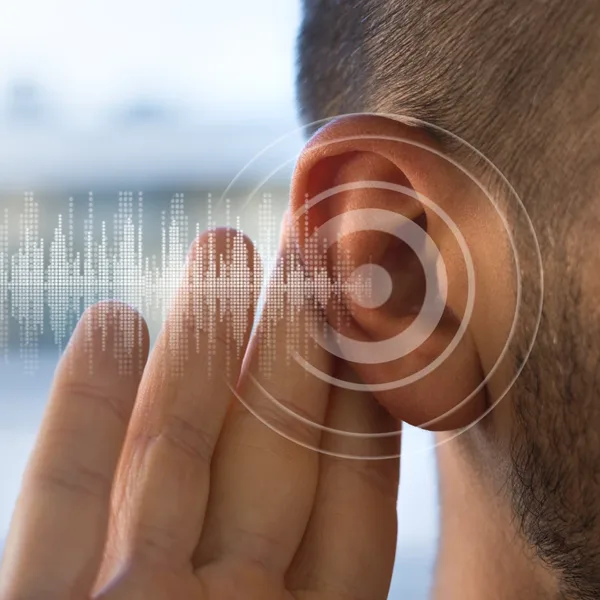
November is National Diabetes Awareness Month, a time dedicated to raising awareness about a condition that affects more than 38 million people in the United States alone1. Diabetes is a chronic medical condition in which the body has difficulty producing and processing insulin, an essential hormone that regulates blood sugar (glucose). According to the National Institutes of Health (NIH), people with diabetes are twice as likely to experience hearing loss2.
In this article, we explore the link between diabetes and hearing loss and provide tips to safeguard your auditory health and maintain a higher quality of life.
How Diabetes Can Affect Hearing
Diabetes can have far-reaching impacts on various bodily functions, and one area that is often overlooked is hearing. The delicate structures in the inner ear responsible for hearing are particularly vulnerable to the effects of poor blood sugar regulation.
High blood sugar levels can damage the nerves and/or blood vessels throughout the body, including those in the inner ear responsible for hearing3. As a result, this damage can affect how nerve signals travel from our ears to the brain, leading to permanent sensorineural hearing loss (SNHL).
Below, we provide a detailed overview of ways diabetes can impact hearing health:
Chronic Inflammation
Inflammation is a common complication of diabetes that also increases the risk of sensorineural hearing loss (SNHL)8. High blood sugar levels, common in people with diabetes, can lead to an inflammatory response in the body6.
Over time, this inflammation can damage the delicate hair cells in the inner ear resulting in SNHL.
Poor Blood Circulation
Poor blood circulation is a common diabetes complication that can impact healthy blood flow throughout the body. Blood delivers oxygen and essential nutrients to all areas of the body.
When blood circulation is restricted to the inner ear, the tiny hair cells can become damaged or even die, leading to irreversible hearing loss.
Diabetes-Related Stroke
People with diabetes are up to 2X more likely to experience a stroke than those without the condition5. Scarier still, this risk increases the longer a person has diabetes.
A stroke occurs when blood flow to the brain is blocked or severely reduced, depriving it of oxygen. If the part of the brain that controls hearing is affected by a stroke, it can lead to partial or complete hearing loss.
Even a mild stroke can disrupt the auditory pathways in the brain, impairing the ability to process sound. In some cases, diabetes-related strokes can also affect the blood vessels and nerves in the ear itself, further increasing the risk of hearing loss.
Frequent Ear Infections
Diabetes can compromise immune functions, increasing the chances of getting sick, remaining sick for longer, or contracting serious illnesses6. This can lead to frequent ear infections, which can cause hearing damage. Untreated and/or recurring ear infections can lead to permanent damage and irreversible hearing loss.
Age-Related Hearing Loss (Presbycusis)
As we age, it’s natural for our hearing levels to decline. However, research shows that individuals with diabetes are 30% more likely to develop age-related hearing loss11. Age-related hearing loss, also known as presbycusis, is a common form of SNHL that develops gradually.
Proactive hearing exams and awareness of hearing loss symptoms can help individuals with diabetes effectively monitor this risk.
Medicine Induced Hearing Loss (Ototoxicity)
Healthcare professionals may prescribe medications to help diabetes patients manage blood sugar, cholesterol, and/or blood pressure. However, some of these medications can have an ototoxic effect7. Ototoxic medications can permanently damage the inner ear, leading to sensorineural hearing loss.
Diabetes-Related Hearing Loss Prevention Tips
Effectively managing both diabetes and hearing health is crucial to minimizing the risk of hearing loss and other related complications. Below are some practical tips and easy lifestyle strategies to help safeguard against diabetes-related hearing loss:
Proper Diabetes Management
Proper diabetes management is key for maintaining your overall well-being, including your hearing health. It’s important to follow all recommendations from your healthcare provider to keep your blood sugar levels in a healthy range.
Managing blood sugar reduces the risk of damage to the blood vessels and nerves in the inner ear, which are vital for hearing function.
Adopt Healthy Lifestyle Habits
A healthy lifestyle plays a critical role in preventing complications from diabetes as well as hearing loss. A balanced diet rich in whole grains, lean proteins, fruits, and vegetables helps keep blood sugar levels stable and supports healthy blood pressure and circulation.
Regular physical activity also helps improve blood circulation and reduces inflammation, which is important for maintaining optimal hearing. Quitting smoking and limiting alcohol intake also contribute to better hearing and overall health.
Get Your Hearing Checked Regularly
Routine hearing check-ups are essential for detecting any changes in hearing as early as possible. Hearing loss develops gradually, and symptoms may be difficult to notice until it’s too late. In fact, a recent study found that 25% of participants with diabetes who reported no hearing complaints had hearing loss and were not aware of it10.
Having regular hearing exams ensures any changes to your hearing are caught early on so you can take action to prevent further damage. Your hearing healthcare specialist will also be able to monitor any changes in your hearing over time, allowing for prompt intervention if any concerns are identified.
Schedule a Hearing Exam at an Audibel Clinic Near You
The connection between diabetes and hearing loss is an important but often overlooked aspect of managing the condition. Fortunately, by staying vigilant and adopting proactive management strategies, it is possible to protect both your hearing and your overall health.
Early detection and intervention are key. Don’t wait —take charge of your health today by scheduling a hearing exam at an Audibel clinic near you.
References
- National Diabetes Statistics Report. (2024, May 15). Diabetes. https://www.cdc.gov/diabetes/php/data-research/index.html
- Hearing Loss Is Common in People with Diabetes. (2015, September 20). National Institutes of Health (NIH). https://www.nih.gov/news-events/news-releases/hearing-loss-common-people-diabetes
- Hearing loss. (2024, May 15). Diabetes. https://www.cdc.gov/diabetes/diabetes-complications/diabetes-and-hearing-loss.html
- Nerve damage. (2024, May 15). Diabetes. https://www.cdc.gov/diabetes/diabetes-complications/diabetes-and-nerve-damage.html
- Mosenzon, O., Cheng, A. Y., Rabinstein, A. A., & Sacco, S. (2023). Diabetes and stroke: What are the connections? Journal of Stroke, 25(1), 26–38. https://doi.org/10.5853/jos.2022.02306
- Your immune system and diabetes. (2024, May 15). Diabetes. https://www.cdc.gov/diabetes/diabetes-complications/diabetes-immune-system.html
- Promoting ear health. (2024, May 15). Diabetes. https://www.cdc.gov/diabetes/hcp/clinical-guidance/how-to-promote-ear-health-for-people-with-diabetes.html
- Evidence supporting the hypothesis that Inflammation-Induced vasospasm is involved in the pathogenesis of acquired sensorineural hearing loss. (n.d.). National Institutes of Health. https://www.ncbi.nlm.nih.gov/pmc/articles/PMC6875011/
- Rask-Madsen, C., & King, G. L. (2013). Vascular complications of diabetes: mechanisms of injury and protective factors. Cell Metabolism, 17(1), 20–33. https://doi.org/10.1016/j.cmet.2012.11.012
- Mishra, U. P., Behera, G., Sahoo, A. K., Mishra, S., & Patnaik, R. (2024). The impact of diabetes mellitus on sensorineural hearing loss: a Cross-Sectional study in Eastern India. Cureus. https://doi.org/10.7759/cureus.52431
- Samocha-Bonet, D., Wu, B., & Ryugo, D. K. (2021). Diabetes mellitus and hearing loss: A review. Ageing Research Reviews, 71, 101423. https://doi.org/10.1016/j.arr.2021.101423







Have a question or Comment?